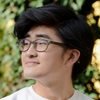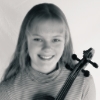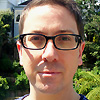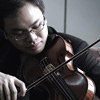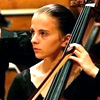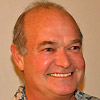Chris Bourke interview - Page 10
Chris: What was the attitude to your electronic experiments.
Douglas: Oh I think a lot of people were very upset about it, my colleagues, "Why does he have to do that?". But you see the interesting thing was that the studio quickly became a focal point for other composers: Jack Body, Ross Harris, John Cousins, John Rimmer and a good many more and this was the best thing that could have happened for it. It gave them a place to work when they came to Wellington and it gave us a meeting ground. Out of that of course came two more studios - one in Auckland and one in Canterbury.
Douglas: Equipment, valve oscillators, was picked up off the floor of Broadcasting Stores, but I had some support from Broadcasting who took the line, well this could be a sort of annexe for their productions department, and very good people like Bill Austin there.
Chris: I've been trying to place you in the international development of music.
Douglas: I don't think I have a place in the international development of music; I've never been part of an avant-garde movement or anything of that kind, and I never wanted to be, because my upbringing led me to distrust anything of that kind. We're getting on complex ground…
Chris: You didn't stop composing for traditional instruments.
Douglas: Up to a certain point I thought I could make use of those instruments, validly to say what I wanted to say, but I didn't want to move into a contemporary field or make them do things they weren't designed to do; I'm quite happy to leave that to younger composers. If I were going to make a different kind of sound I'd prefer to do it through electronic instruments.
Chris: We should write in instruments of the era.
Douglas: To me those older instruments, the violin, they embody a civilisation, initially, and I don't like to go against the grain of that. It's common knowledge that orchestral players used to leave their good instruments at home when they had to play a contemporary piece. They didn't want to ruin a bow by playing the wood on the back or something like that - they'd use a second hand bow. That didn't interest me.
Chris: You didn't straddle the two, electronic plus instrument - like the early electronic pieces.
Douglas: They had done that and had come back, so that it was either one or the other. One of the reasons is that orchestral players don't like to be left to do the composing. Even that brilliant group of Stockhausen's protested at him giving them verbal directions and telling them to play. They want something on paper. So this happened to be the period when I dived into the studio and could ignore it all.
Chris: You were still writing pieces with poetry etc, working the two forms in.
Douglas: I've never tried to be too analytical about what I'm doing, it seems to stem from an age when one cannot really analyse. Mozart said it had something to do with the shape of his nose I think, why he wrote the way he did. I've always felt that I'm a little bit out of time with what I've written, but on the other hand my work doesn't seem to date - things like Aotearoa Overture have a sort of freshness and exhilaration about them still, if I may say that.
Douglas: I've always felt too that I'd like my music to be a bit like a parable - both very simple and to have many degrees of meaning, according to how far one wants to move into it. I think that might be true for something like the Nine Short Pieces for Piano - they can be listened to very simply on the surface; if you go looking for structure then there are quite adequate structures.
Chris: Are natural sounds a big part of your electronic music.
Douglas: Not as much as I thought they might, because in fact they turned out to be very intractable - those beautiful bird songs [laughs] as rough as can be when you come to analyse them - full of gutturals and sibilants.
Chris: Availability of equipment very important to what you write.
Douglas: Up to a point, but I was impressed when I was in Toronto by Gustav Ciamaga. He said the best composition comes out of the small studios with limited equipment - the big studios are so preoccupied with the technological race they haven't got time to deal with composers. I took that to heart too, Just as I always liked the fact that Haydn said the font of his originality was his isolation at Esterházy.. Life is full of paradoxes of all kinds - I think they're very important.
Chris: Like the thing, it's what you leave out that's important.
Douglas: Very often it is - you have to know what can be left out. But for all that I keep coming back to the Bach inventions, two and three part, because I think they're such absolute models of poetry, of logic of clarity [chuckles]. The Fugues are grander models…but the little inventions are like jewels.
Chris: Staying with the electronic world, in only fifteen years the technology…
Douglas: The technology can only develop given enough finance and you can only get enough finance in the short term if you aim for the commercial market .. It was just a stroke of very good luck I think that the Putney synthesisers were developed in London with some help from Tristan Carey.
Chris: Monophonic and simple.
Douglas: Not too simple at all - I did most of my work using them, and especially when you could link a couple of them together. What Ross [Harris] has up there now - I don't go up into the place because of course, its somebody else's kitchen, can't go back - but what I've heard of new developments, they all seem to me to be a rather stereotyped product. Very skilful, too skilful in a sense, the machinery takes over. I want to do something different, I don't necessarily want to do what the machine wants to do [chuckles].
Chris: Using sampling synthesisers Electronic music has taken a backward step.
Douglas: I don't think we should be doing this kind of thing, what I know of - I've heard a bit of what the Fairlight can do and am not at all impressed, and have heard the Synclavier - a monstrous thing, and I've heard this new gadget that Ross [Harris] has got [DX7] I'm very impressed, but it's not what I want to do…
Chris: To get away from tonal music.
Douglas: But I think to do that, you lose 90% of your audience. There's the danger that it just becomes just another kind of Wurlitzer Organ. So I think a much more helpful development is what Jack Body is doing. - joining Eastern and Western music.
Chris: So the direction of electronic music is shaped now by commercial requirements.
Douglas: They can only build it if they can sell it to pop groups. Hours and hours of razor blades, splicing, standing on one's feet ten, twelve hours a day [laughs]. The keyboard can be used in that world too - the keyboard played quite a part in Carousel - you can use it in quite different ways, not as tunes but to bring in voltages, which operate on whatever sound is going through. Its awfully simple now - I often think that Franz Liszt was the first synthesiser - he spent all those years practising on the piano to get those cascades of sound and nowadays any kid can walk into the studio, plug in a sine tone and a couple of modulating frequencies and the machine will do it, and one hundred variants of it.
Chris: I can understand you saying now that its "somebody else's kitchen".
Douglas: Exactly. I had fifteen years up there, that was enough.. and I think the last piece that I did really brought me full circle to what I'd been wanting to do all the time: take the natural sound of the river and lake at Taupo and weave it into the texture of the electronic sound and fuse them in some way.
Chris: So the Soundscape has brought you full circle, you've said what you wanted to say.
Douglas: In those terms, yes. My Scottish great aunt lived till 94 [laughs] so I might suddenly at 77 get lit up. I've been loafing for a good long time now, but not entirely, I've had a lot of other things to do: put my estate in order, establish a trust fund, to clean out a fifty year accumulation of manuscripts and papers and letters and try to make some sense of it which nobody else could do, and to get what is relevant into the Turnbull library.


